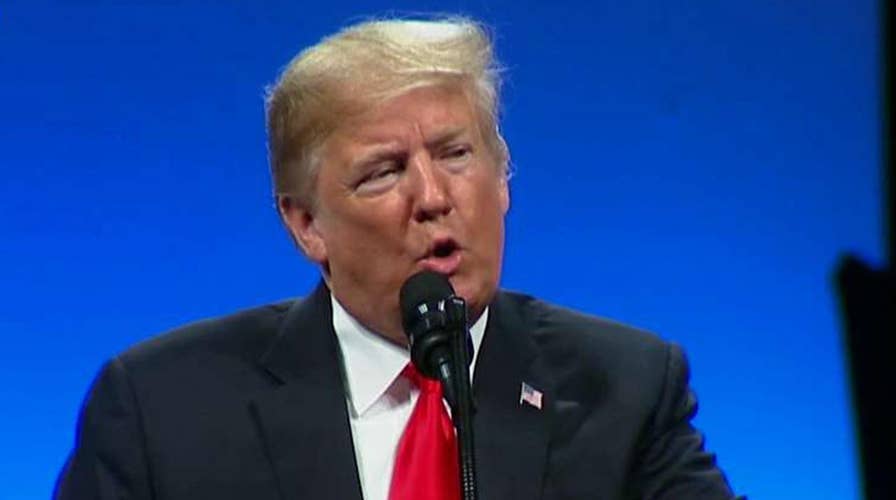Trump pledges support for law enforcement in Chicago
President Trump tells International Association of Police Chiefs conference in Orlando, Florida, that he has directed the attorney general to go to Chicago to deal with a 'shooting wave.'
The Justice Department announced Tuesday that it would oppose a proposal to reform Chicago's policing practices that is now being considered by a federal judge.
The announcement came one day after President Trump advocated using the "stop-and-frisk" police method to combat Chicago's high violent crime rate. The city reached an agreement with the American Civil Liberties Union of Illinois in 2015 to curb stop-and-frisk procedures after the group threatened to file a lawsuit claiming the practice inordinately targeted blacks.
In a statement, Attorney General Jeff Sessions said the 2015 agreement "dramatically undercut proactive policing in the city and kicked off perhaps the greatest surge in murder ever suffered by a major American city." Sessions also warned it was "imperative that the city not repeat the mistakes of the past" with the new decree.
"The safety of Chicago depends on it," Sessions said.
Under the stop-and-frisk method, large numbers of people are temporarily detained, questioned and sometimes searched for drugs and weapons. It was used extensively in New York City until it was deemed unconstitutional because of findings that it had an overwhelming impact on minority residents.
A report last year by former U.S. Magistrate Judge Arlander Keys noted a dramatic decrease in the number of stops since the ACLU lawsuit but found that officers were still targeting minorities. The number of investigatory stops fell from more than 1.3 million in 2014 and 2015 to just over 54,000 in the first six months of 2016, the report said.
"Gotta be properly applied, but stop-and-frisk works," Trump told a convention of the International Association of Chiefs of Police in Orlando, Florida, on Monday. The president also said he had asked Sessions to "immediately" go to Chicago "to help straighten out the terrible shooting wave." It was not immediately clear what Trump had asked Sessions to do, and the attorney general's Tuesday statement did not elaborate on next steps.
An initial draft of the plan, called a consent decree, was agreed to in July and an updated version was unveiled last month. Under the revised plan, officers would be required to file paperwork whenever they point a gun at someone, even if they don't fire.
Chicago's police union has opposed the plan, saying it would "have a devastating effect upon policing in Chicago" and lead officers to hesitate in situations when they are actually in danger. Mayor Rahm Emanuel, who has announced he will not seek a third term next year, has said he is confident the agreement "will stand the test of time."
U.S. District Judge Robert Dow is scheduled to hold two days of public hearings on the plan beginning Oct. 24. If he approves it, an independent court monitor will ensure that the city meets benchmarks laid out over several years.
Chicago police said last week that there have been 102 fewer homicides and nearly 500 fewer shooting victims in the city this year, compared with the first nine months of 2017. However, the number of murders still exceeds those in Los Angeles and New York.
The Associated Press contributed to this report.





